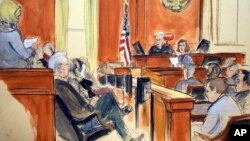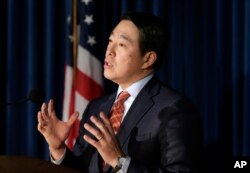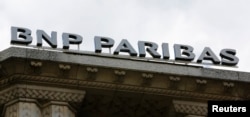Ankara is slamming the conviction in the U.S. of a Turkish banker for violating U.S. sanctions on Iran.
Speaking to reporters Friday at Istanbul airport after the conviction of Mehmet Hakan Atilla, deputy chief executive of Turkish state-owned lender Halkbank, Turkey’s President Recep Tayyip Erdogan said that the case was part of a “chain of serious plots” against his nation.
Erdogan warned that bilateral legal accords with the United States were “losing validity.”
“If this is the U.S. understanding of justice then the world is doomed. There can be no such understanding of justice,” Erdogan said.
Earlier, Mahir Unal, the spokesman for Turkey’s ruling AKP, also pointed the finger directly at Washington.
On Wednesday, Mehmet Hakan Atilla, who headed international banking at Halkbank, was convicted by a New York court on five of six charges of violating U.S. sanctions on Iran. With prosecutors presenting evidence of several Turkish banks involved in extensive laundering of money to avoid Iranian sanctions, analysts warn the door is open to a potential wide range of financial sanctions.
Such measures range from fines on Turkish banks to extensive restrictions on banks’ ability to borrow on U.S. financial markets. Turkey borrows on average about $16 billion a month to sustain existing loans and meet its financial obligations.
Joon Kim, the acting U.S. attorney in Manhattan, speaking after the conviction, made clear there would be consequences. “Foreign banks and bankers have a choice: You can choose willfully to help Iran and other sanctioned nations evade U.S. law, or you can choose to be part of the international banking community transacting in U.S. dollars. But you can’t do both.”
“Best case scenario is a couple of billion dollars in fines against Halkbank for violating sanctions and the American administration closing the file, and that’s the end of it,” said political consultant Atilla Yesilada of Global source partners.
The Turkish finance minister, Mehmet Simsek, already has guaranteed that any fines would be covered by the government.
Despite international investors reportedly closely watching the New York case, Turkish financial markets on Thursday were largely unaffected by Wednesday’s verdict.
The experience of previous foreign banks caught violating U.S. sanctions suggests the repercussions could be severe for Turkish banks.
An economist specializing on financial matters relating to Turkey — working for an international bank and speaking anonymously — warned that given the scale of the violations outlined by prosecutors in the New York case, Halkbank could face fines of up to $40 billion. Last year Turkey’s Haber Turk newspaper reported U.S. authorities were considering a similarly large fine.
Observers single out the Halkbank case from previous sanction-busting cases. During the New York trial, the prosecutor witness implicated Turkish government involvement in sanctions violations, including then-Prime Minister Erdogan.
“If the Trump administration wants to portray this as a state crime, as Ankara systematically violating Iranian sanctions, I don’t think anyone can stop them,” said Yesilada.
Analysts suggest the price of leniency by Washington could be Ankara having to cool its warming relationships with Moscow and Tehran, as well as the toning down of its hostility toward the Syrian Kurdish militia, which has been backed by the U.S. in fighting Islamic State militants.






